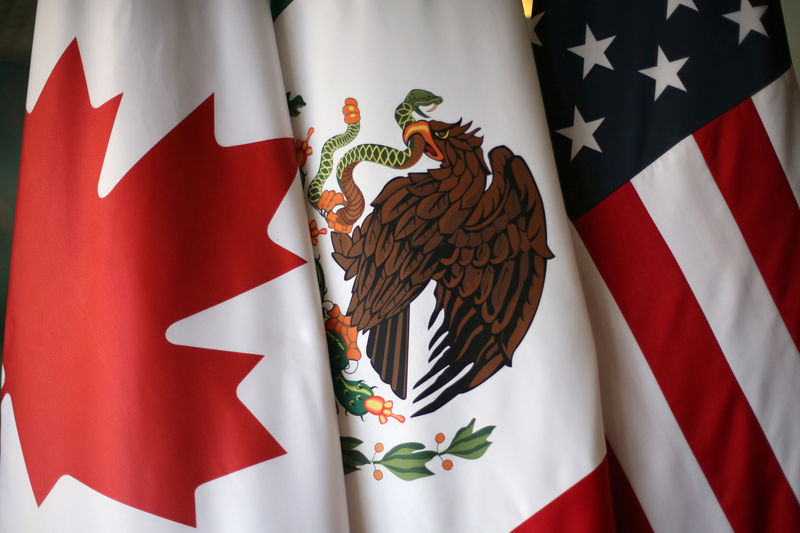* Tech, industrials lift Wall Street
* Canadian dollar at four-month high, Mexican peso gains
* Brent hits 2014 high ahead of Iran sanctions
* Graphic: World FX rates in 2018 http://tmsnrt.rs/2egbfVh (Updates with U.S. markets open, changes dateline to New York from London)
By Abhinav Ramnarayan
NEW YORK, Oct 1 (Reuters) - A last-minute agreement between the United States and Canada to rescue a trilateral NAFTA accord with Mexico drove up global stock markets and the Canadian dollar on Monday.
The new United States-Mexico-Canada Agreement (USMCA) announced on Sunday rescues a $1.2 trillion open-trade zone that was on the brink of collapse after nearly a quarter century. Dow Jones Industrial Average .DJI rose 266.92 points, or 1.01 percent, to 26,725.23, the S&P 500 .SPX gained 20.39 points, or 0.70 percent, to 2,934.37 and the Nasdaq Composite .IXIC added 43.99 points, or 0.55 percent, to 8,090.34.
MSCI's gauge of stocks across the globe .MIWD00000PUS gained 0.34 percent.
"The trade deal is helping risk appetite across the board, especially the Canadian dollar, and that will likely lift appetite for emerging-market currencies across the board," said Manuel Oliveri, a currency strategist at Credit Agricole (PA:CAGR) in London.
The Canadian dollar CAD= was up 0.85 percent against the dollar at a four-month high and the Mexican peso MXN= hit its highest in over seven weeks, up nearly a percent on the day.
USMCA is aimed at bringing more jobs into the United States, with Canada and Mexico accepting more restrictive commerce with the United States, their main export partner.
It also effectively maintains the current auto sector and largely spares Canada and Mexico from the prospect of U.S. tariffs on their vehicles, although it will make it harder for global auto makers to build cars cheaply in Mexico. of U.S. carmakers rose, with Ford F.N rising 1.6 percent and General Motors (NYSE:GM) up GM.N 1.5 percent.
The pan-European FTSEurofirst 300 index .FTEU3 rose 0.15 percent, led by Italian stocks .FTMIB , which bounced off two-week lows hit last week.
On Friday, Italian stocks, bonds and the euro had all sold off on worries over a budget proposal from Italy's new anti-establishment government, particularly after a report said the European Union was set to reject the plan such were the scale of the losses that some analysts believed the market had gone too far.
"The math just does not justify the price action we saw on Friday. Not even close!" Unicredit (MI:CRDI) economist Erik Nielsen wrote in a note on Sunday.
The euro was also initially hit by worries about a rise in Italy's fiscal deficit, dropping below the $1.16 mark EUR= , but it recovered as the session progressed to trade slightly higher at $1.1612.
Also casting a shadow on markets were two surveys on Sunday that showed growth in Chinese manufacturing sputtered in September as domestic and export demand softened broadest index of Asia-Pacific shares outside Japan .MIAPJ0000PUS closed 0.19 percent lower.
Benchmark Brent oil neared its highest since November 2014 on Monday, driven by concern about a supply crunch once U.S. sanctions against Iran come into force next month. crude CLcv1 rose 0.6 percent to $73.69 per barrel and Brent LCOcv1 was last at $83.31, up 0.7 percent on the day.
